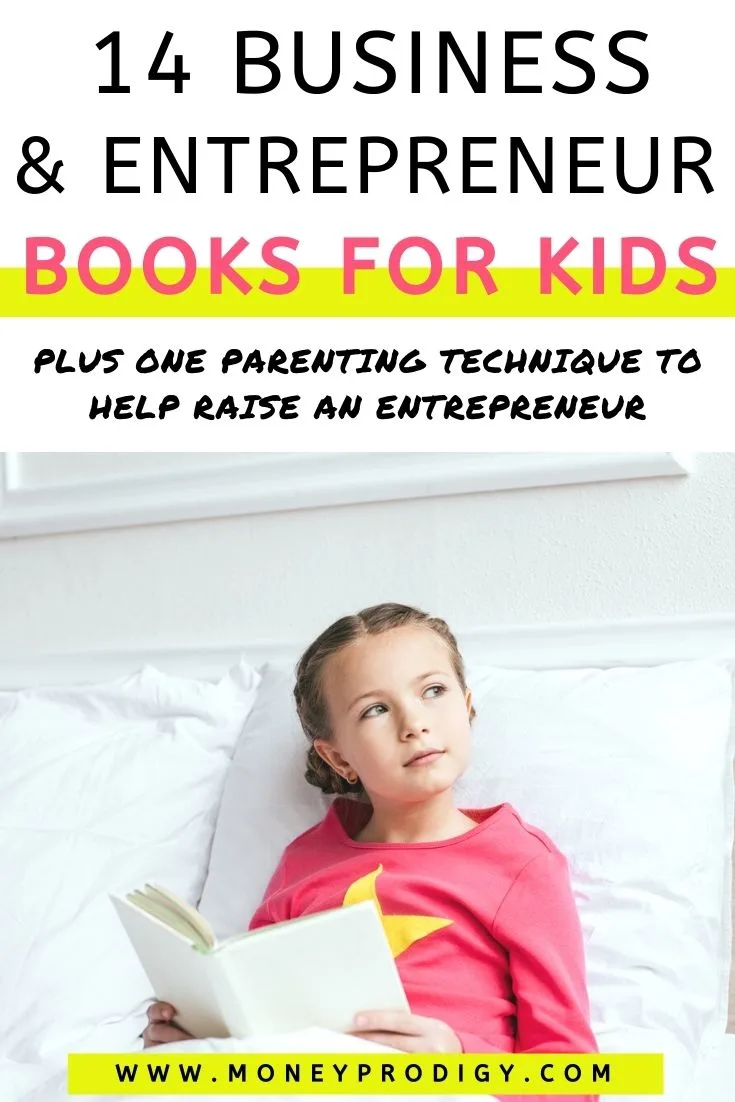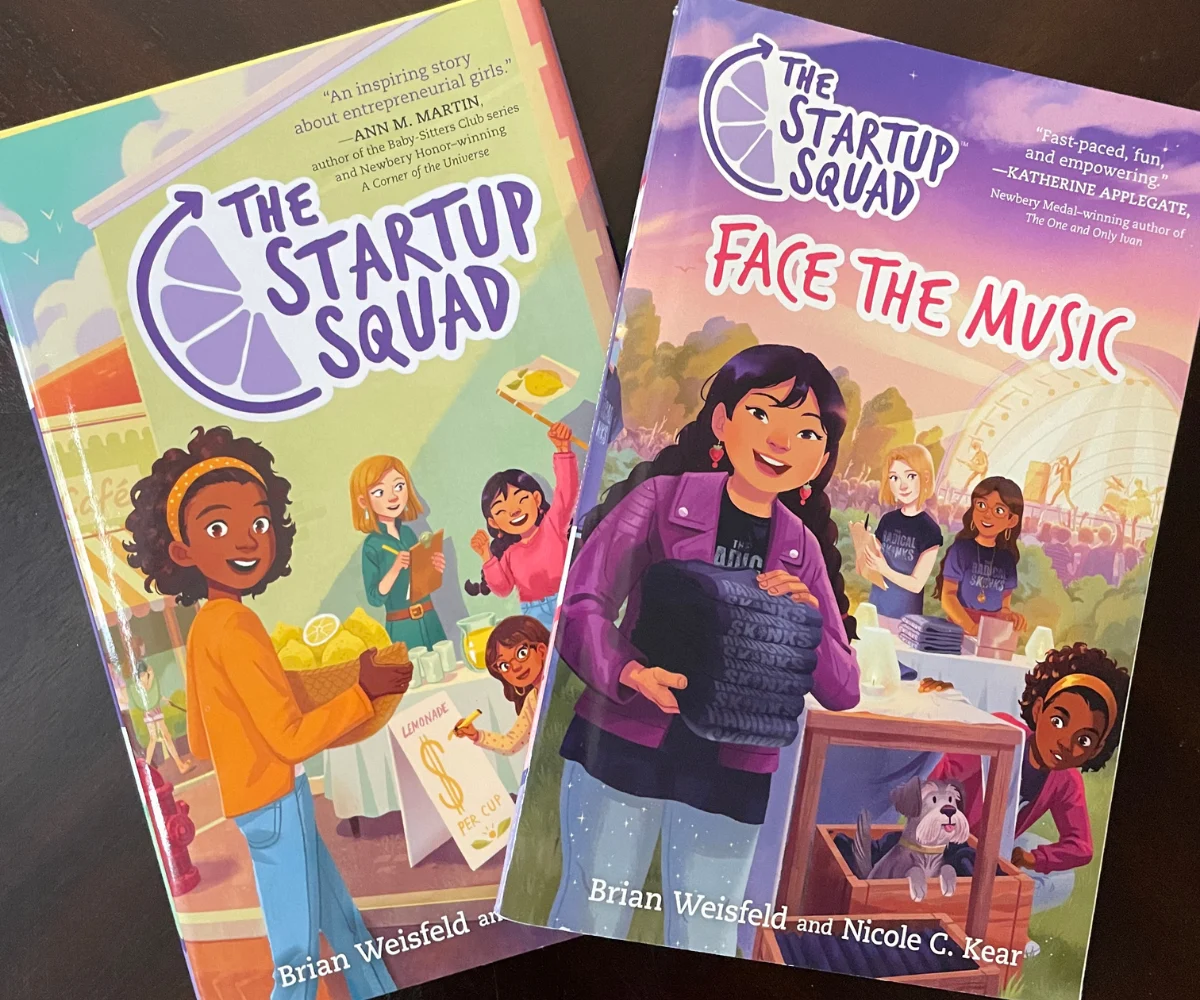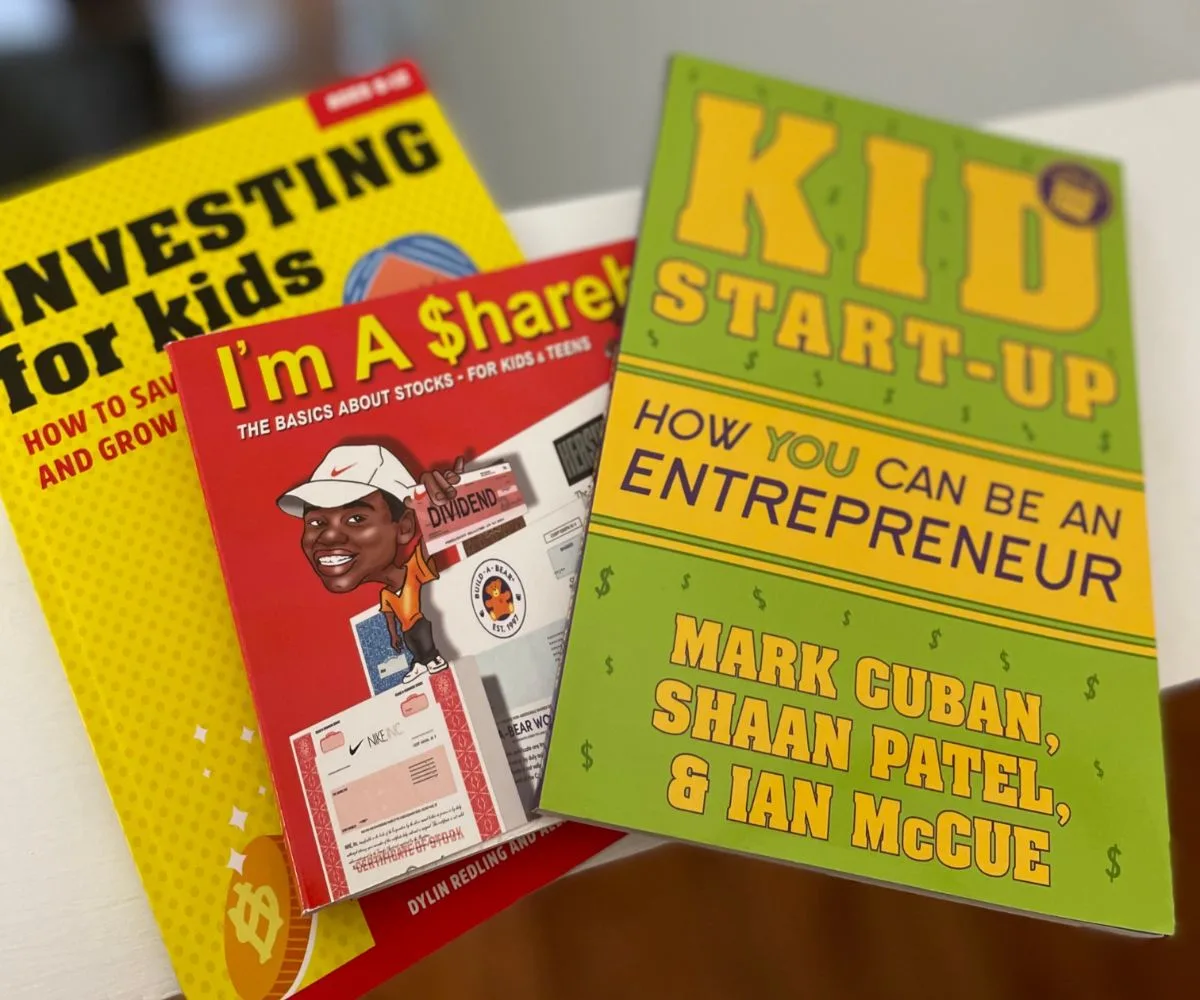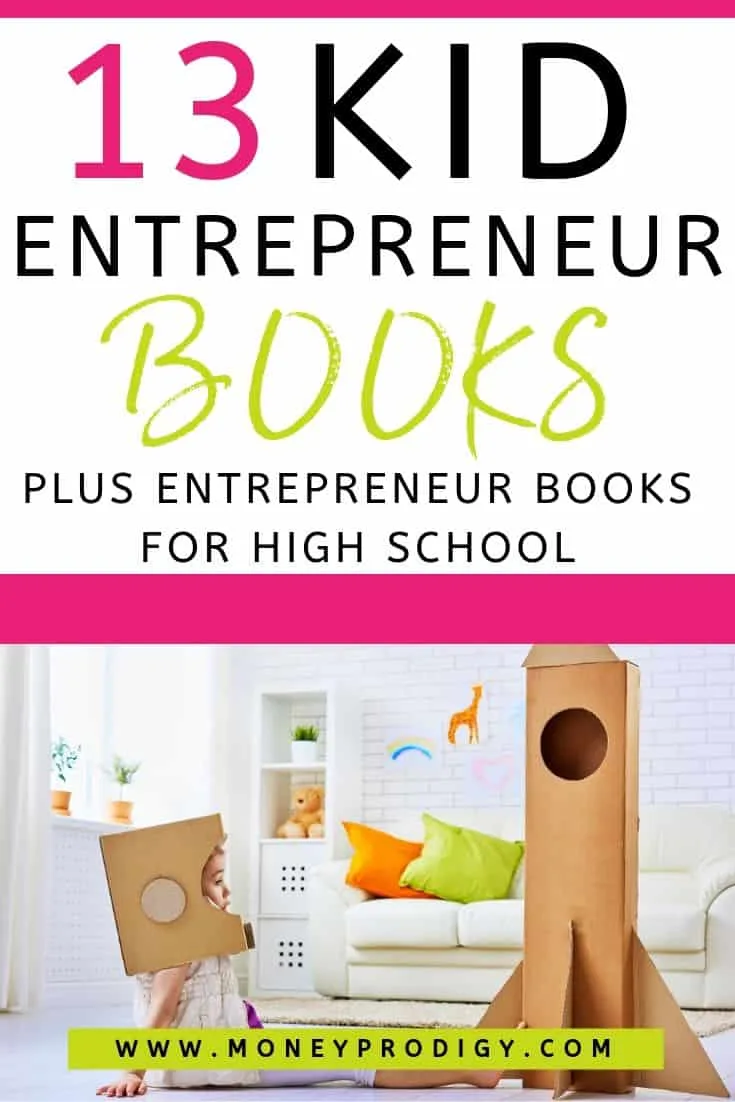Help your kidpreneur go after their business dreams with one of these 14 kid entrepreneur books.
Kid entrepreneurs and their successful business stories are popping up everywhere.

Take 11-year-old Leanna, for example, who was constantly being complimented about her hair. Turns out, she was making her own homemade hair products – chemical-bare hair dressings, hair butters, and shampoos – and saw an opportunity to open her company, Leanna's, Inc.
In 2010, she raked in $100,000 in profits, and in 2011, that number was more like $300,000 (you know, in between school assignments, first-time crushes, and whatnot).
Or Mikaila Ulmer, who, after being stung by two bees in one week, was sent her grandmother’s 1940s recipe book with a special lemonade recipe in it to help make her feel better. She created Me & the Bees Lemonade, which now is being sold in Whole Foods Market after her stint on Shark Tank.
These stories are kinda unreal (as in, out-of-the-ordinary). I mean, most of the Mama entrepreneurs I know (myself, included) don't make even close to that much money from our businesses!
But they are truly inspirational. Especially for kids with big ideas of their own.
Business Books for Kid Entrepreneurs
Your safest place to start a kid-with-all-the-ideas is to hand them one of these entrepreneur books for kids.
It’s a relatively low-cost way for you + your kiddo to explore this new territory, and learn a few things in the process. Like whether or not they’re really serious about this, or if their idea will go the way of toddler-sized Elsa dolls in two weeks.
Psst: stick around for the end where I talk about a pattern I found after reading 23 entrepreneur biographies that you can do yourself to raise your own kid entrepreneur.
1. Lemonade in Winter, Emily Jenkins
Age Range: 3-7 years
What’s one of the first rules of creating a product? Give the people what they want. And really, when they want it. Timing is everything.
As in, who wants to buy a cup of icy lemonade in winter, when these two decide to open up their lemonade stand?
Another entrepreneur reality these two learn the hard way: you don’t make a profit if you spend as much money to make the product as you bring in selling the product.
Bonus: here are my best lemonade stand ideas, and lemonade stand worksheets.
2. What Do You Do with a Problem?, Kobi Yamada
Ages: 4-8 years
All businesses exist because they solve a problem. First, they find a problem, or perhaps stumble into it, and then they see that it is actually an opportunity to make something, offer something, or do something, that will make the problem go away.
This book is all about not being scared by problems or worried by them, but facing them dead on and seeing them for the opportunity that they really are.
3. Rosie Revere, Engineer, Andrea Beaty
Ages: 5-7 years
Does your kid love to make things out of what the rest of us consider trash? This book might be for them! It's about a kid, Rosie, who loves to build things out of ‘throwaways’. Her Uncle ends up laughing at her one day, and she becomes shy about her inventions. But then her grandmother teaches her (and your child) that great flops are necessary on the path to great success.
4. Lulu Walks the Dogs, Judith Viorst
Age Range: 6-10 years
This book drives home the point that a (successful) entrepreneur’s journey is hardly ever walked alone. You need help. Even if it’s just from the pesky neighbor boy who seems to know an awful lot about things + is super polite.
Follow along as sassy Lulu learns the hard way about making money from a variety of sources.
5. Amelia Bedelia Means Business, Herman Parish
Age Range: 6-10 years
Amelia sets her green eye on the brand new bike Suzanne has…and she just has to get one, too. The only problem (aside from basing her wants on someone else’s)? Her parents will only pay for half of the new bike.
Amelia sets up a lemonade stand next to a car lot because she’s convinced there will be thirsty customers. Follow along while she thinks of creative ways to both win the bike, as well as to advertise her new business.
6. Whoosh!: Lonnie Johnson’s Super-Soaking Stream of Inventions, Chris Barton
Ages: 7-10 years
The author in this entrepreneur biography for kids does a great job of taking your kid through the ups and downs of an inventor’s career through an invention they’ll be highly interested in: the Super Soaker.
Lonnie Johnson had been an inventor his whole life, but actually just stumbled into this invention by accident (isn't that just the way things work sometimes?). His parents allowed him to mess with things as a kid, despite their small living space in a mobile home (and lots of kids).
This book is great about showing the troubles inventors and entrepreneurs often face. For example, Lonnie took a test that told him he wasn't going to be a good engineer. Boy was that proven wrong! At one point, Lonnie even quits his job, though it doesn’t pan out for a while. Of course, once he found a toy company to latch onto his idea, he was good to go.
Psst: here's an article with 10 different inventions that were created by kids.
7. The Lemonade War, Jacqueline Davies
Age Range: 7-10 years
What an adorable book – I absolutely adored reading it.
And the reason why this is great for your kidpreneur-in-the-making to read? It breaks down these huge business concepts and makes them understandable through something your tween gets – a lemonade stand. We’re talking concepts like underselling, value-added, profit margins, franchises, etc.
A further lesson I love is the underlying idea that you’ve GOT to take action. Action in business is how you see results – both good and bad – and learn from them. Then tweak, and move on.
8. The Startup Squad, Brian Weisfeld and Nicole C. Kear
Age Range: 8-12 years

I love how this book wraps all kinds of business lessons around lemonade stands in this entertaining read for girl tweens.
A class of kids is given the task of opening a lemonade stand for two weekends to help fundraise money for their school trip to Adventure Central. The team that earns the most cash wins VIP tickets for the day.
Your tween will get to watch common business concepts in action from people their own age, such as:
- The ideation phase of entrepreneurship
- Working with others toward a business goal
- Different selling techniques
- Pricing a product
- How supply issues can affect profit
A fun read!
Psst: need help getting your child's mind working on ideating? Here are 22 simple things for kids to make and sell, and 17 boy crafts to sell.
9. Kid Start-Up
Age Range: 9-12 years

Did you know that Mark Cuban from Shark Tank got together with a few other entrepreneurs and created a book/workbook for kids to start their own businesses?
Here's what I love about this book:
- Solid stories of kid and teen entrepreneurs that you won't find elsewhere – really inspirational information for your kid to read.
- Entrepreneur and business start-up advice, like the nuggets you find on Shark Tank, but written out so that kids and teens can get it.
- Emphasizes looking at business as a way to help people.
- Great sales strategy ideas, such as reducing your customer's costs when they buy several products or a bundle of your products/services.
- Exercises to look at other examples of businesses and critically think through them, such as listing a product/service user experience out and seeing how it could be improved upon.
This book also has a fun layout to attract kids and teens right from the start!
This is one of the best books for kid entrepreneurs who have an idea and really want to get going with it.
10. The Toothpaste Millionaire, Jean Merrill
Age Range: 10-12 years
Note: Originally published in 1972, this book takes place in an era when many authors, including this one, talked about things like race/age/sex discrimination. So just a heads up!
this line from the book pretty much sums up why I’m recommending it: “As I mentioned before, math isn’t my favorite subject. But I think everybody should take a course in toothpaste.”
This book gives an overall introduction to the manufacturing business and makes the whole thing a very tangible subject. Not to mention, the main character essentially does what Leanna did with her hair products: he figures out how to make a homemade toothpaste recipe that is much cheaper than what’s on the market, and has no chemicals in it.
I love how this book shares the process of his wins and losses while trying to figure out a recipe, then figure out how to actually package it, etc.
11. Lawn Boy, Gary Paulsen
Age Range: 8-12 years
Note: Get this book for your kiddo for the business and entrepreneur lessons. However, warn your kid about the use of penny stocks and investing their money with random people, because Lawn Boy makes a small fortune when his stockbroker-neighbor-turned-business-manager invests his money into penny stocks.
I’ve said it before and I’ll say it again: financial limits breed creativity. In this case, being a broke kid bred a whole business!
Lawn Boy chronicles a kid’s journey through starting a successful lawn-mowing business − complete with employees − all because his parents didn’t have enough money to help him buy a new bike inner tube (bikes seem to be a recurring motivational theme in these books, eh?).
Lots of economics here, but it makes entrepreneurship and the skills you’ll need for it (plus the hurdles you’ll be faced with) much more accessible.
12. Lunch Money, Andrew Clements
Age Range: 8-12 years
The main character, Greg Kenton, is obsessed with earning cash. Like, totally money-crazy. One day he figures out that all of his friends and schoolmates carry around extra quarters with them (market research at its best!) − for things like ice-cream sandwiches, cupcakes, neon pens, pencils, and other things to buy at school – he sets out to find a way to get all those quarters.
He bounces around from product ideas as first a middleman of sorts, and then an inventor of mini-comic books kids can read in school. Once he figures out how to mass produce them, someone else gets smart on the process (a competitor!) plus he gets into trouble with his principal (legal issues!).
Lots of entrepreneurial lessons here are introduced in a non-intimidating way, like marketing, figuring out your audience, gross earnings versus profits, trademark issues, etc.
Psst: you'll also want to check out my article on business books for teens.
13. Better than a Lemonade Stand!, Daryl Bernstein
Age Range: 9-13 years
This 15-year-old gives your kiddo 55 different business ideas that go well beyond the lemonade stand. Originally written in 1992, there are examples included throughout of actual kids who took this kid’s advice and how they created a business from it.
There’s a lot of positivity in this book, and I’ll have to warn you that you may not agree with all the advice spouted off by the then-15-year-old at the beginning of the book. Examples include, “When you earn your own money, it’s yours to spend as you wish…[i]f you prefer to buy loads of candy, go ahead!” And you might want to reinforce the idea of charity against his statement, “When I see a need, I charge a fee to fill it.”
14. Seventeen Against the Dealer, Cynthia Voigt
Age Range: 12+ years
Note: This is actually Book #7 in a series; however, I didn’t read the other ones before it and thought the story worked well on its own.
Dicey Tillerman sets her eyes on opening a boatyard business where she’ll craft boats for a living. However, she lacks business sense, boat-making experience, and wads of cash to start things off (capital).
Psst: Of course, business sense can be picked up as you go (*cough* not that I would know ANYTHING about that).
One of the most important lessons from this book is the need for contracts between you and the people you are working within business. Not to mention the need for an extra-cushioned emergency fund if you’re just starting a business and don’t have another source of income coming in. There’s also a nice introduction to the idea of business insurance.
Want more kid + teenager entrepreneur stories? Check out my article on kid entrepreneur kits, my full review of the Teen Entrepreneur Toolbox, and 3 kid business plan examples.
I read 23 entrepreneur biographies and noticed ONE parenting technique that 98% of their parents used
A funny thing happens when you read 23 books within one genre – in 2 months, no less – while researching for a kid’s career exploration article: you start to see a pattern.
And this particular pattern?
I didn’t just see it; it slapped me over my face in nearly every one of those 23 books.
So, I got to thinking: could this ONE parenting technique be the secret to raising a “successful” adult?
While I don’t necessarily believe that one particular parenting technique guarantees your kiddo’s future success, the fact that this one showed up in nearly 23 different biographies of successful people – people who became big deals in their profession of choice – made me want to share it with you.
I mean, how can 23 different successful people be wrong about what helped them achieve all they did?
That No. 1 Reason is….
Each of their parents – who were unknowingly raising successful children – allowed them to experiment with what they were naturally interested in as a child.
Seriously, it’s that simple + straight forward.
But stay with me here a second.

Because when I say ‘experiment’? I mean EXPERIMENT.
Like…
- Super-Soaker Inventor: Lonnie’s parents let him continue his experiments even after one caught fire in their kitchen…with the only stipulation being that they had to be done outside of the house moving forward.
- Explorer + Scientist: Charles Darwin’s father thought the idea of him going aboard the HMS Beagle to explore places was a “wild scheme,” but still let him go.
- Astronaut: Leland Melvin wanted a skateboard that his father could not afford. Instead of saying no, his father told him he’d have to build one.
- Oceanographer + Shark Enthusiast: Eugenie Clark’s mother surprised her with a saltwater aquarium.
- Book Writer: Ted Geisel’s (aka, Dr. Seuss) mother was fine with him drawing all over his walls. And his father shared tales from his zoo + the comic strips out of his newspapers with him. Did I mention his parents let him enter a drawing contest run by the Springfield Union…one that he won?
- Computer Programmer: Grace Hopper’s mother just giggled after her child had taken apart seven different clocks throughout their home to figure out what made them tick. Which led her to fix her alarm clock, build her dolls an elevator in their dollhouse suite, and even enlist in the Navy at age 36 to write programs for computers.
What this Suggests We Mama Bears Should Be Doing
In figuring out how to raise a successful child, your role in encouraging and supporting your child’s sometimes crazy ideas + experimentation cannot be understated.
Yes, it can get annoying. Especially with the messes (I’m an organized nut, myself).
Yes, it can get tempting to mold your kid’s activities, which is good some of the time, but never all of the time.
Yes, it can seem to be a waste of resources – both money and time.
But let them play, unstructured, experimenting to their heart’s content around what they naturally gravitate towards. And see where they end up. It's worth a shot because don't we all want to know how to raise a successful and happy child?
What are YOUR kids naturally interested in, and how have you found ways to indulge this (or ways you'll allow them to in the future)?
Your child may have thought about wanting to start a business, or shown some interest in running a lemonade stand. For my friend and I, it was starting a bean bag business (not much demand in them…nor supply, for that matter, as we slacked off on production). Bottom line? I would have loved to have read these books before and while going through that bean bag business (a total flop, by the way. But oh, the fun we had!).
So, get your kid reading! Business books for kids, kid entrepreneur books…who knows where it might lead them.
Amanda L. Grossman
Latest posts by Amanda L. Grossman (see all)
- 50 Banking Activities for Kids (Student Financial Literacy) - February 14, 2024
- 14 Christmas Activities for High School Students (they’ll Actually Find Cool) - December 1, 2023
- 3 Fun Selfie Scavenger Hunts for Teens (Christmas, Fin Lit, etc.) - November 27, 2023

Charlene R
Monday 2nd of July 2018
Another awesome book... The Lemonade Stand Millionaire by Gail Haynes. Perfect for kids and their parents. Teaches them all about making money, saving, responsible spending and giving back.